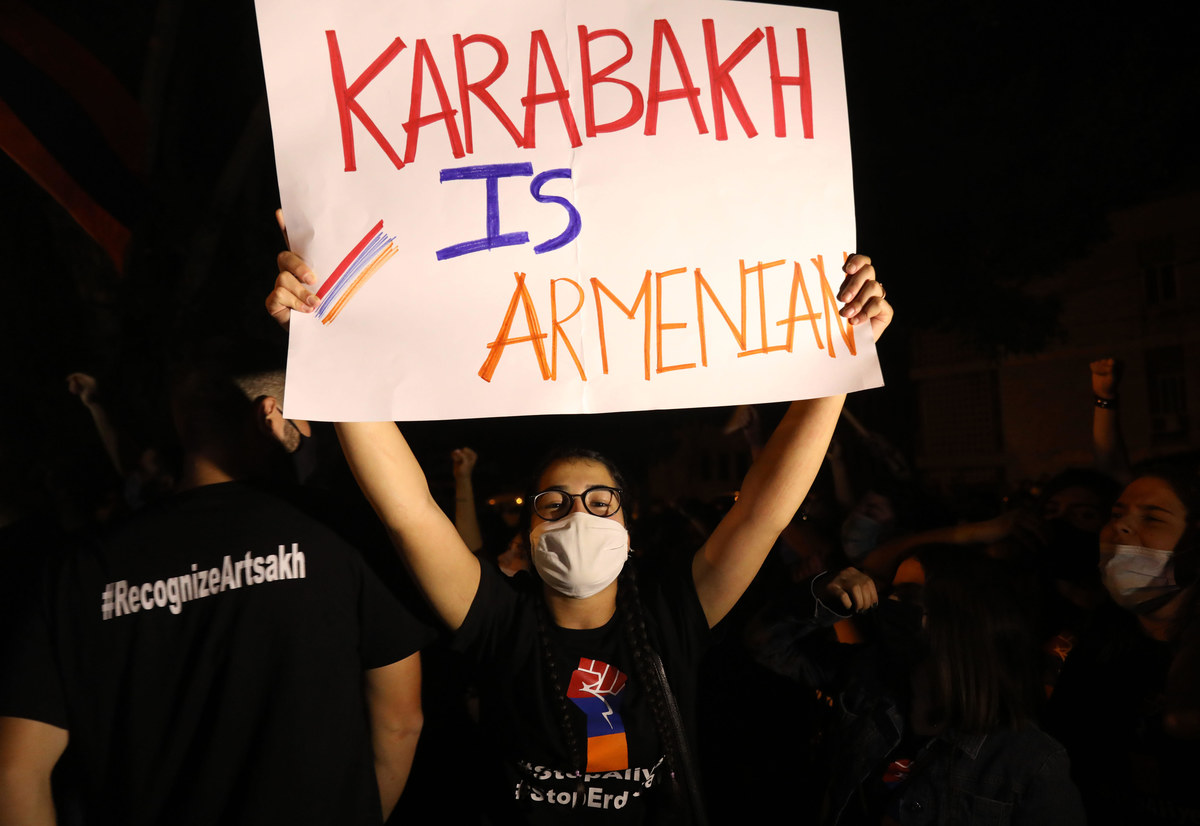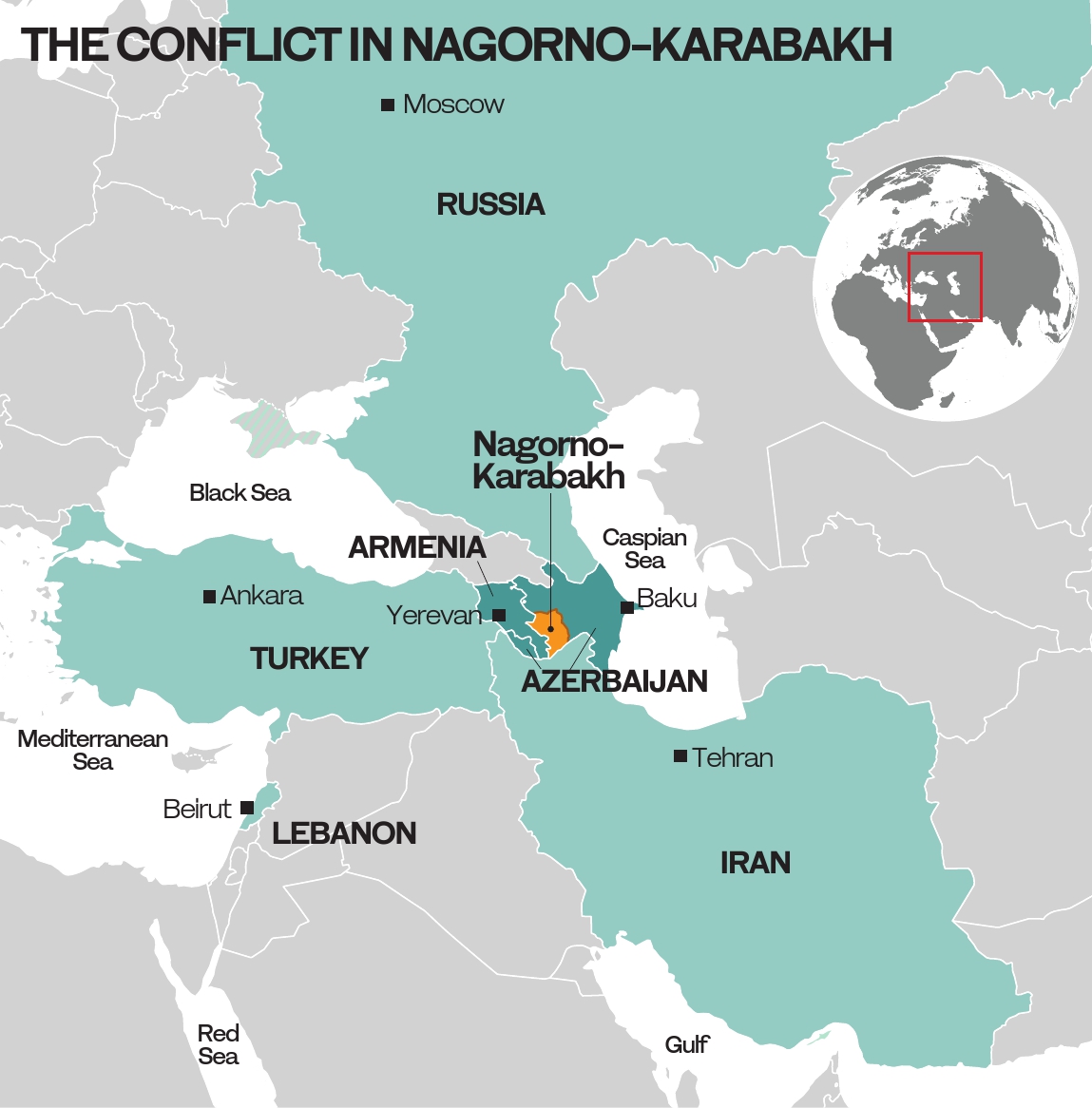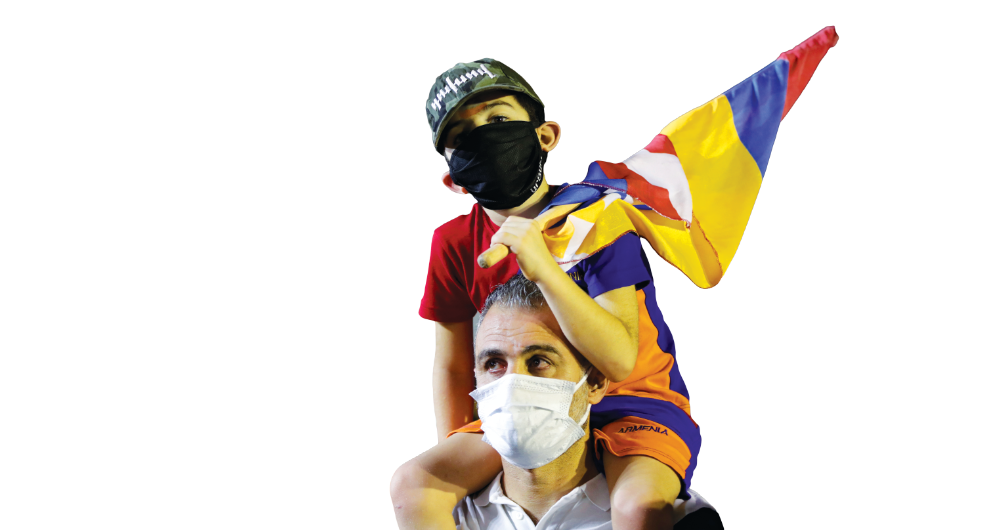BEIRUT: Kevork Hadjian was a much loved opera singer, famous for his mesmerizing voice and the allure he lent to patriotic Armenian anthems. Born and raised in southern Lebanon’s Bekaa Valley, the ethnic Armenian lived for a time in Kuwait before moving to Yerevan, Armenia’s capital, with his family in 2004.
An ardent patriot, Hadjian held a special place in his heart for Artsakh, the ancient Armenian name for Nagorno-Karabakh. He fought there briefly in 2016 in what became known as the Four-Day War.
So when Azerbaijan targeted the breakaway region’s capital Stepanakert on Sept. 27, the singer again volunteered to fight for its independence. Just over a week later, on Oct. 6, he was killed on the front line. He was 49.
Hadjian is among the more recognizable casualties of the recent fighting. Their deaths have become something of a rallying cry for young Armenian-Lebanese tempted to follow in their footsteps.
Lebanon is home to a significant Armenian diaspora, descendants of the 1.5 million ethnic Armenians who escaped the genocide 100 years ago — a crime that Turkey to this day refuses to acknowledge.
But the passage of time has failed to quiet Armenian nationalist fervor, stoked anew by the war in the South Caucasus. “Armenians have already seen genocide,” Ishkhan Y, a Lebanon-born Armenian, told Arab News in Beirut. “This is history repeating itself in Artsakh. As Armenians of the diaspora, we are very concerned and upset by what is going on in Artsakh.”

Lebanon is home to a significant Armenian diaspora. (AFP)
Whispers around Beirut and social-media chatter tell of ethnic Armenians who have left Lebanon to join the war, like many others in the wider diaspora. In Bourj Hammoud, the Armenian district of Beirut, many walls are graffitied with slogans criticizing both Turkey and Azerbaijan.
The same is happening in Hadjian’s birthplace in the Bekaa Valley, where villagers say young men are leaving for Nagorno-Karabakh. “There were no calls from the Armenian government or from a political party for them to go,” one villager, who did not want to be named, told Arab News. “They left because they felt it was their duty to go and fight.”
Fighting erupted in late September between Azerbaijan and ethnic Armenians in the contested territory of Nagorno-Karabakh, reigniting the decades-old dispute. Turkey is widely accused of encouraging Azerbaijan to launch the latest offensive, and has sent weapons and funding to support Baku’s war effort.
Nagorno-Karabakh, a mountainous region with a population of around 150,000, is internationally recognized as part of Azerbaijan, but is claimed and governed by the ethnic Armenians who live there. A diplomatic solution to end the dispute has evaded the warring parties since the 1994 ceasefire.
As the former Soviet republics accuse one another of launching unprovoked attacks, towns and villages have since been indiscriminately shelled, some with banned cluster munitions, according to the rights watchdog Amnesty International. Entire buildings have been reduced to rubble, forcing thousands of civilians from their homes.
Two ceasefire deals have failed to hold — the first brokered by Russia on Oct. 10 and another by the US on Oct. 18. Mike Pompeo, the US secretary of state, held separate meetings with the foreign ministers of Armenia and Azerbaijan in Washington on Oct. 22, taking over from Moscow’s earlier attempts at establishing a dialogue.
According to a statement from the Armenian Ministry of Defense on Oct. 27, Azerbaijani forces shelled Armenian border guards near the country’s southeast frontier with Iran, expanding the conflict into Armenia proper.
 Presenting Baku’s side of the conflict in an oped in Arab News on Oct.2, Ramil Imranov, an Azerbaijani diplomat, wrote: “Armenia keeps trying to legalize the consequences of the war and raise the international prestige of the separatist regime established by Armenia in the occupied Nagorno-Karabakh region of Azerbaijan. By constantly violating the cease-fire achieved in 1994, Armenia tries to consolidate the existing status-quo.”
Presenting Baku’s side of the conflict in an oped in Arab News on Oct.2, Ramil Imranov, an Azerbaijani diplomat, wrote: “Armenia keeps trying to legalize the consequences of the war and raise the international prestige of the separatist regime established by Armenia in the occupied Nagorno-Karabakh region of Azerbaijan. By constantly violating the cease-fire achieved in 1994, Armenia tries to consolidate the existing status-quo.”
A member of the Armenian diaspora, who asked to remain anonymous, said: “Like all Armenians, we as Lebanese-Armenians believe the only solution in the end is a peaceful solution.” But for many Armenians, the conflict in Nagorno-Karabakh is about more than the territory itself: It is part of a wider assault on the essence of Armenian identity.
“Whether it is Turkey or Azerbaijan, both states have a tradition of historical revisionism towards Armenians,” he said. “Turkey does so with the Armenian genocide and Azerbaijan has done so regarding the history of Armenians living in Nagorno-Karabakh.
“Since the 1960s, Azerbaijani authorities have relayed a revisionist history of the Armenian people, claiming that everything related to Armenian history on Azerbaijani land is actually related to the Caucasian Albanians,” he said.
“The same historical revisionism extends to the Azeris’ idea of Armenia and its territories, all of which they believe belong to Azerbaijan. Azeris deny our rightful place in history.”
Many Armenians claim Ankara has a neo-Ottoman agenda and is working hand in glove with Azerbaijan to exterminate them, pointing to the televised remarks in July by Turkish President Recep Tayyip Erdogan: “We will continue to fulfill the mission our grandfathers have carried out for centuries in the Caucasus.”
Armenian-Lebanese artist Manuella Guiragossian, whose grandmother survived the genocide, believes Turkish government policies are infused with anti-Armenian sentiments.
“If you can imagine what they did to my grandparents during the genocide, you can also imagine what they will do to an entire Armenian population today,” she said. “Turkey’s objective is to do what they did during the Ottoman Empire and take more land and unite Azerbaijan and Turkey and totally remove Armenia from the map.”

Ankara and Baku have both denied accusations that mercenaries from Turkish-controlled parts of Syria and Libya are involved in the conflict, but reports of Syrian casualties of the Nagorno-Karabakh war are trickling in from multiple sources.
Some members of the Armenians diaspora want the international community to take the Nagorno-Karabakh situation far more seriously. American socialite Kim Kardashian West, who is of Armenian descent, has donated $1 million to the California-based Armenia Fund to support the humanitarian effort.
“Even if the whole planet does not support the Armenians, you have a massive number of Armenians rising up all over the world right now, from Los Angeles to Boston and London and Paris,” said Guiragossian.
For Armenian-Lebanese like Ishkhan, the only way to stop the fighting is through international pressure. “Peace and safety can only be guaranteed through the recognition of a free, independent Artsakh by the international community,” he said.
“Armenians have to be able to live freely, safely and securely. Children must be able to go to school, mothers should not cry over their lost sons and husbands because of an insane war, supported by Turkey’s ambitions, financial means and military technology and fueled by their allies.”
Until then, many young Lebanon-born Armenians rightly or wrongly are convinced their best option is to follow the example of volunteers like Hadjian.
“We have no choice but to fight for our land and our country,” said Ishkhan. “We must win this war.”
Twitter: @rebeccaaproctor




























